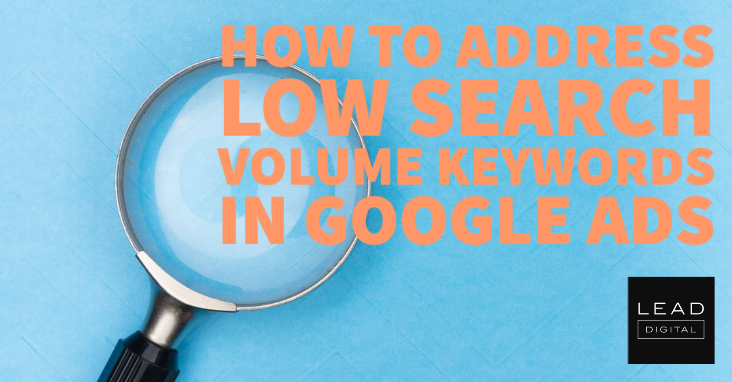 You’ve done it! You built your first Google Search campaign after many hours of planning, projecting, and strategizing. The ads and keywords are all uploaded and visible in the interface, and you are performing your final QA. But then it hits… you open the campaign only to find out that Google has flagged many of your keywords as ‘low search volume’ and won’t trigger ads for them. Have no fear! This is a common situation for Search advertisers, and there are several ways to address it.
You’ve done it! You built your first Google Search campaign after many hours of planning, projecting, and strategizing. The ads and keywords are all uploaded and visible in the interface, and you are performing your final QA. But then it hits… you open the campaign only to find out that Google has flagged many of your keywords as ‘low search volume’ and won’t trigger ads for them. Have no fear! This is a common situation for Search advertisers, and there are several ways to address it.
How is a Keyword Considered Low Volume?
A Google Ads keyword is considered low volume when Google associates very little search traffic with it, which shows that the keyword is irrelevant to most customers’ searches. When a keyword is flagged, Google will not trigger ads for this keyword until volume projections increase above a certain threshold.
The first test you can do is upload your keyword build into the Google Ads keyword planner to get volume projections. This will help inform potential monthly impressions/spend for your keyword set, and you can adjust prior to uploading if needed.

Before we jump into how to address this, it’s important we review how to avoid this entirely by understanding how keyword match types function in the world of 2020 Search advertising.
How Can I Avoid Low Volume Keywords?
Close variants were expanded in July 2019 in Google Ads to give Google freedom to expand a keyword based on misspellings, singular/plural, stemmings, abbreviations, and accents. Gone are the days of specific keywords misspellings and super long-tail keywords. Here is an example where the bolded keyword will cover all the non-bolded queries through close variants:
- “swimming suits”
- “bathing suits”
- “swim suits”
- “suits for swimming”
- “swimnig suits”
As a whole in the industry, we are moving towards Google having more control and advertisers lose control, and this is a prime example of this and how to get in front of it.
Broad match modified keywords are a common culprit of low search volume. The functionality of these keywords is often misunderstood when included in a campaign build. Let’s say you’re in the education space and sell certification courses for a trade of some sort such as HVAC. You build the following keyword set to show ads for how you expect a user might search for this:
- +hvac +technician +certification
- +hvac +technician +certification +courses +near +me
- +hvac +technician +certification +classes +Indiana
- hvac +technician +program
- +hvac +technician +program +near +me
- +hvac +technician +program +Indiana
The bolded keywords will capture any searches that the non-bolded keywords might capture, so essentially the non-bolded keywords are redundant and likely the ones flagged for low search volume.
This brings up the point that keywords that are broader are likely more expensive because you’re competing for more available queries, which puts you in a rough spot of choosing between bidding on expensive keywords with intent that’s difficult to gauge or keywords that might not even show. Which brings the question…
My Product/Service Is Super Specific, and I Can’t Avoid Low Volume Keywords. What Do I Do?
This is all too common especially for smaller advertisers that have small budgets, niche products, and are competing with mega-brands that have seemingly unlimited spending power. There will always be a more broad keyword that will fit your service. The trick is to be creative with the audience side of Search advertising in conjunction with your keyword/ad copy strategy to improve ad spend efficiency and ultimately performance.
RLSA (remarketing list for Search ads) and ALSA (audience list for Search ads) are both common strategies that tells Google “I want to bid on a keyword but only deliver the ad if a user falls within a particular audience”. Think of it as layered targeting where you are setting two qualifiers for the user to be eligible to be served an ad. These strategies are your ticket out of the hole of low search volume. – Read more



